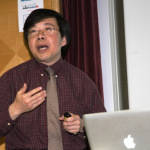 Dr Kuan-Teh Jeang, Editor-in-Chief of Retrovirology, passed away on 27th January. We understand that Teh was well known and well liked by his friends and colleagues, so we would like to invite you share your memories and add your messages of condolences to this post. Below is a message about Teh from Dr Gottesman of NIH.
Dr Kuan-Teh Jeang, Editor-in-Chief of Retrovirology, passed away on 27th January. We understand that Teh was well known and well liked by his friends and colleagues, so we would like to invite you share your memories and add your messages of condolences to this post. Below is a message about Teh from Dr Gottesman of NIH.
Dear colleagues,
Some of you have now heard the tragic news about Kuan-Teh Jeang of NIAID, who died suddenly and unexpectedly late Sunday night, on January 27. The cause of his death has not been verified, and I do not have the full details to relay.
I am sure you share my sense of shock and grief. Teh was 54 years old, had a remarkably productive scientific career, and was broadly admired on the NIH campus and in the field of virology and, in particular, retroviruses. I still can’t believe, more than a full day after his death, that I am sending this kind of message about him to the NIH staff.
In my introduction for Teh for the George Khoury Lecture that he delivered in October 2012, I described him as a dynamo. He was chief of the Molecular Virology Section in NIAID’s Laboratory of Molecular Microbiology, where he was a major figure in the fields of HIV and HTLV-1. In his 27 years at the NIH, he co-authored more than 300 publications and edited six books. He was the editor-in-chief of the journal Retrovirology, editor at Cell & Bioscience, associate editor of Cancer Research, and on the editorial board of numerousother scientific journals, including the Journal of Virology. He also was the recent past-president of the Society of Chinese Bioscientists in America, where he was outspoken in his desire for increased representation in leadership positions for Asian American scientists.
Teh’s recent awards include the International Retrovirology Association Dale McFarlin Award in 2011, Biomed Central’s Open Access “Editor of the Year” in 2010, and several Gates Foundation grant awards.
Teh’s lab studies host factors that influence the pathogenesis of human retroviruses HIV-1 and HTLV-I. Some of his group’s notable recent findings include: new insights into RNA modification and RNA-binding factors that affect HIV-1 post-transcriptional gene expression; successful genome-wide characterization of 252 human host cell factors in Jurkat T cells that are contributory to HIV-1 replication; and characterization of several oncogenic microRNAs and their contributions to HTLV-1 oncogenesis.
Teh had a colorful childhood. He was born in Taiwan, spent his childhood in Libya, came to the United States at age 12, and was accepted to the Massachusetts Institute of Technology at age 16. He arrived at the NIH in 1985 upon earning MD and PhD degrees from Johns Hopkins University. He was a postdoc in the lab of George Khoury, another great NIHer who tragically died young, for whom an NIH Wednesday Afternoon Lecture is named.
Teh’s death is a blow to the NIH and the retrovirus research community; and our thoughts and condolences are with Teh’s family: his wife Diane, a veterinarian with the FDA’s Office of Regulatory Affairs, and his children David, John and Diana. We will keep you informed about any planned funeral or memorial arrangements.
Michael Gottesman, M.D.
Deputy Director for Intramural Research, NIH

Comments